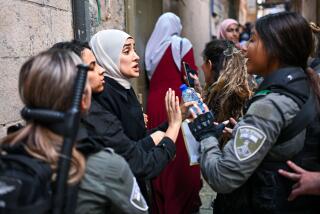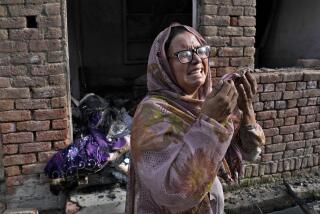Iraqi Shiites Erupt Over Shrine Attack
- Share via
BAGHDAD — An explosion in Samarra tore through the dome of one of the most sacred Shiite shrines Wednesday, setting off a nationwide wave of reprisals against Sunni Muslims that threatened to push the country to new depths of fear and disorder.
More than 60 people were killed in the violence around the country, authorities said. Three Sunni clerics were among 47 people killed in Baghdad, police said, and 11 suspected insurgents were executed in Basra after they were taken from a jailhouse by men dressed as guards.
This morning, six bodies were found in Dora on the capital’s southern outskirts, and three Iraqi journalists were found slain near Samarra.
Amid massive protests, dozens of Sunni mosques were attacked nationwide.
In Baghdad, a city seemingly inured to scenes of destruction, the toll Wednesday was stunning: At least 27 Sunni mosques throughout the capital were attacked -- two of them destroyed by fire and others shattered by rocket-propelled grenades and sprayed with bullets, police said.
The violence began when gunmen stormed the Golden Mosque in Samarra, kicked out the Shiite guards and detonated explosives, witnesses said.
No one took responsibility for the near-destruction of the Samarra shrine, where two of the faith’s 12 imams are believed to be buried.
The gold-leafed dome of the once-majestic structure, which sits near the Tigris River about 60 miles north of Baghdad, was sheared off, reducing much of the mosque to a mound of brown rubble and mangled steel frames.
President Bush issued a statement condemning the attack and pledging to fund the rebuilding of the Golden Mosque. His call was echoed by Samarra tribal leaders, most of them Sunnis, as well as Iraq’s Kurdish president, Jalal Talabani.
As images of the ruin were broadcast repeatedly on TV, angry young men, some wielding weapons, took to the streets of major cities.
Throughout the day, anxious officials and community leaders rushed to head off all-out civil strife. Tariq Hashimi, leader of the Iraqi Islamic Party, a leading Sunni group, told reporters at a news conference that Iraqi politicians needed to take charge of the situation “before it spins out of control.”
Inside the heavily guarded Green Zone in Baghdad, Prime Minister Ibrahim Jafari announced that the government would step up security around mosques and other holy sites.
Jafari, speaking live on state-run television, also said that a few suspects had been arrested in connection with the bombing. There were no further details, but Associated Press reported that five police officers responsible for protecting the mosque had been taken into custody.
Jafari ordered government offices closed and appealed for calm, as did Grand Ayatollah Ali Sistani, the nation’s most prominent Shiite cleric, who called for a week of mourning.
But as crowds poured into the streets, the vocabulary of the conflict clearly had changed. Almost three years after the April 2003 U.S.-led toppling of the Sunni regime of Saddam Hussein, more politicians and ordinary citizens began to utter the words “civil war” openly.
“Many ignorant people will be pushed to do the same to the Sunni sacred places,” said Brig. Gen. Mudhir Moula, a high-ranking official in the Iraqi Defense Ministry. “This may be the start of the civil war.”
“The Shiites are very angry. The [extremists] committed the ugliest thing ever,” said Haider Hazem, a 24-year-old shop owner who took part in one of several protests in Baghdad. “We can’t stand it any longer. We are ready to sacrifice our lives.”
Still others urged angry followers not to fall into what they said may be an insurgent trap.
Sheik Asad Mahmouri, a leader associated with radical Shiite cleric Muqtada Sadr, called the reprisals “a spontaneous response to the bombing of the shrine,” but said Sadr had ordered “all the young people to calm down.”
In Sadr City, a massive Shiite slum in Baghdad, another Sadr associate, Rassem Marwani, told hundreds of protesters, “They want to drive us to civil war; we will not let them.”
The response was not reassuring. “We are not satisfied,” protesters chanted back. “Imam Mahdi, witness this,” others said, referring to one of the historical imams associated with the Samarra shrine.
Protesters also used the opportunity to lash out at U.S. forces. “No, no to the occupation!” they yelled.
Ali Kadhimi, a Shiite demonstrator, said he believed the attack was committed by “takfiris [extremists] with the help of American intelligence.”
Nonetheless, he said, “we are here to prevent civil war from happening.”
In Baghdad’s Kadhimiya neighborhood, also a Shiite stronghold, American helicopters hovered overhead Wednesday as groups of men wearing black headbands and carrying machine guns escorted throngs of demonstrators through the streets. Some of the protesters were crying and beating their chests in despair.
On the eastern outskirts of Baghdad, gunmen shot Sunni cleric Khalil Ibrahim, who was defending the mosque where he preached.
Assailants also killed Gazi Mahmoud, another Sunni cleric, and his three bodyguards in east Baghdad, and on the southern outskirts of the capital, gunmen assassinated Sheik Hussain Salman. A fourth cleric, Sheik Abed Nori, was kidnapped in central Baghdad.
In other neighborhoods in the capital, evening prayers were canceled as Sunni worshipers boarded up their mosques.
Many Iraqis stayed in their homes and watched the events unfold on television, which featured nonstop live coverage and call-in programs.
Iraqis of all sects and ethnic backgrounds braced for repercussions.
In the southern city of Basra, gunmen wearing police uniforms seized a dozen Sunni men suspected of being insurgents from a prison and later killed 11 of them, police said.
Shiites stormed and burned the office of the Iraqi Islamic Party, as well as the main Sunni mosque in the city, officials said.
Hashimi, the party’s leader, told reporters at a news conference that Basra police were “cooperating with the mob, burning and destroying.”
In Samarra, a Sunni Arab town of archeological wonders recently beset by fighting between U.S.-led forces and insurgents, residents condemned the attack on a prized landmark as well as a main source of tourism revenue.
“This is a black day in the Samarra history, even darker than when there were military operations in Samarra,” said Mohammed Jaseem, a 38-year-old who works at the city’s pharmaceutical plant. “Now the city is without its golden dome.”
As dusk settled in Baghdad, a sense of dread and panic hung over the city. Jumpy security forces and masked gunmen loyal to various Shiite militias patrolled empty streets.
“The reason for this terrorist operation is to arouse tension inside Iraq and inside the Islamic community,” said Hussein Sadr, a Shiite cleric. “What is needed now is a serious, clear and strong position to calm down the anger and grief of millions of Shiites in Iraq and the Islamic world, because without such strong initiative, I anticipate that the reaction will be violent.”
*
Times staff writers Borzou Daragahi, Megan K. Stack, Suhail Ahmad, Saif Rasheed, Caesar Ahmed, Zainab Hussein and Shamil Aziz in Baghdad and special correspondents in Samarra, Basra and Najaf contributed to this report.
More to Read
Sign up for Essential California
The most important California stories and recommendations in your inbox every morning.
You may occasionally receive promotional content from the Los Angeles Times.













